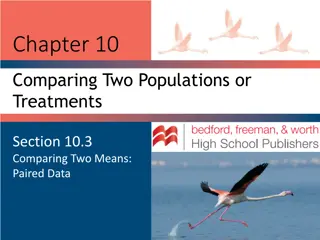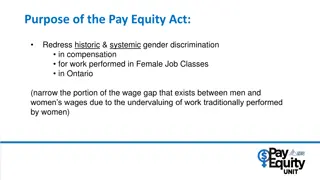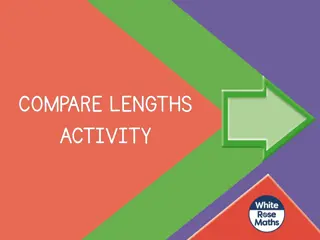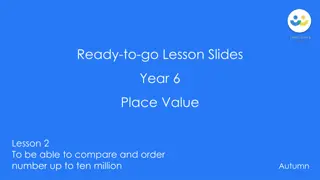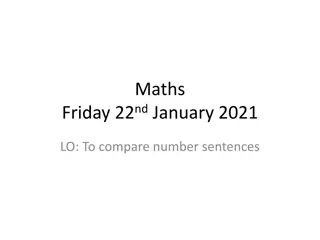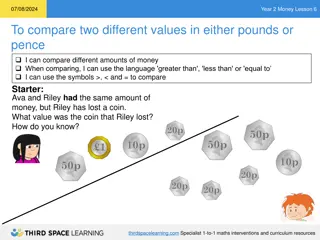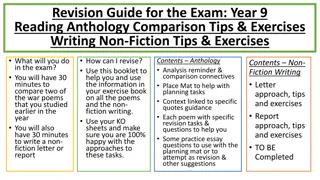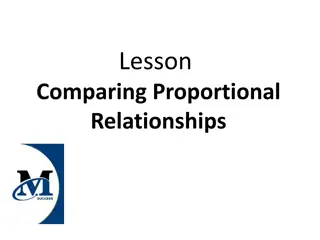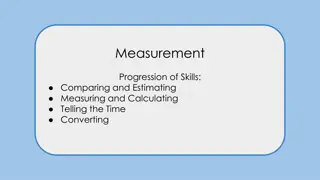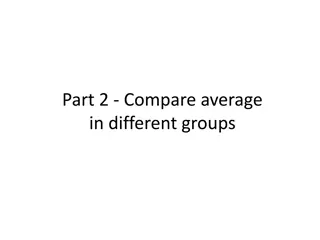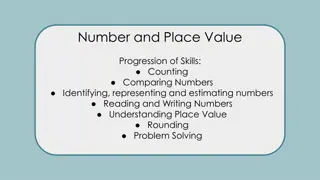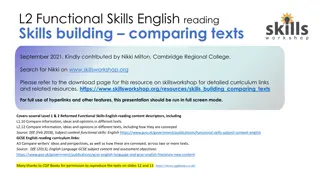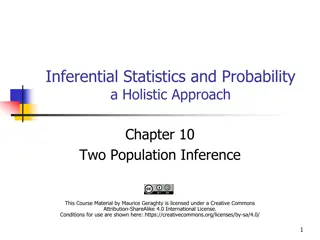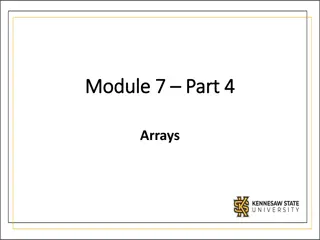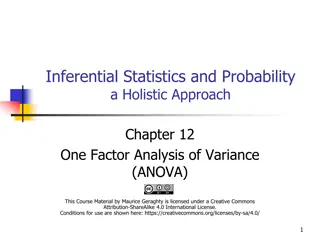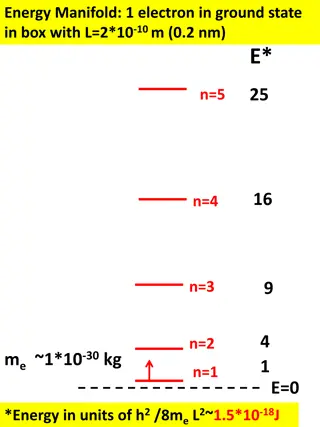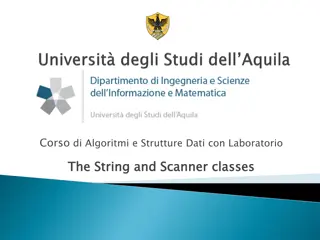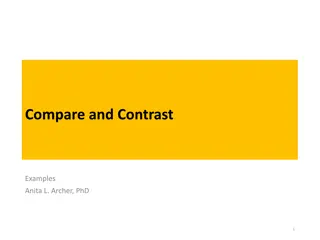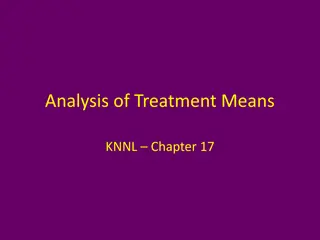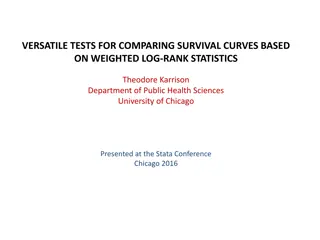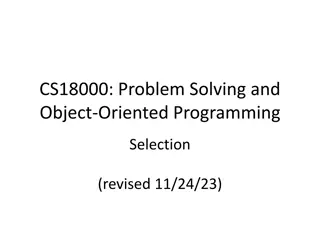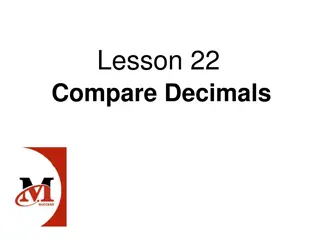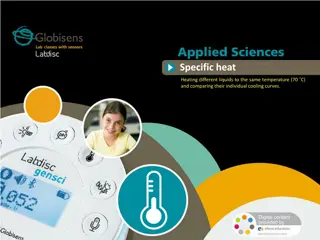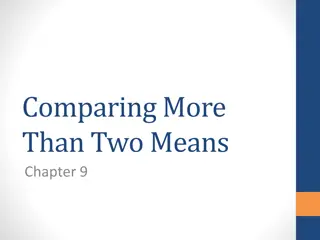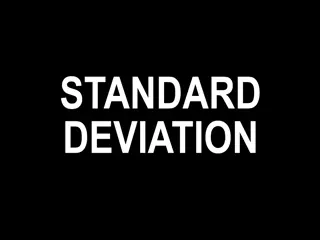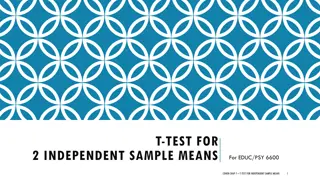Which Factors Are Important to Consider When Comparing Car Insurance Services in the UAE
When comparing car insurance services in the UAE, factors like coverage options, premiums, customer service quality, claim process efficiency, and additional benefits play a crucial role. Finding the right balance ensures optimal protection and peace of mind on the road.
0 views • 3 slides
Algorithm Analysis
Algorithm analysis involves evaluating the efficiency of algorithms through measures such as time and memory complexity. This analysis helps in comparing different algorithms, understanding how time scales with input size, and predicting performance as input size approaches infinity. Scaling analysi
1 views • 30 slides
Civil Applications: Managing Live Cases Webinar Insights
Gain valuable insights on managing live civil cases through the "Help Us to Say Yes" webinar focusing on civil applications, means re-assessments, merits, and more. Learn about processes such as means re-assessment, amending certificates, means representations, and applying for prior authority. Disc
0 views • 41 slides
Effectiveness of Video Observed Therapy in Tuberculosis Management
Tuberculosis (TB) remains a global health challenge with issues of treatment compliance, cost, and distance to healthcare facilities. A study comparing Video Observed Therapy (VOT) with traditional Directly Observed Treatment Short Course (DOTS) in TB management is conducted to improve compliance, r
1 views • 17 slides
An Exploration of Stylistics in Linguistics: Expressive Means and Stylistic Devices 2. Stylistics as a branch of linguistics examines expressive means and stylistic devices which enhance the emotive and aesthetic qualities of language. These include
Stylistics, Linguistics, Expressive Means, Stylistic Devices, Language
5 views • 25 slides
Chapter 10.Comparing Two Populations or Treatments
In a study of identical twins raised in high-income and low-income households, researchers compared IQ scores between the siblings. The analysis revealed that twins from high-income households had a higher mean IQ of 109.5 compared to 103.667 for those raised in low-income households. Although there
9 views • 52 slides
Understanding Pay Equity Act in Ontario
The Pay Equity Act in Ontario aims to rectify historic and systemic gender discrimination in compensation by narrowing the wage gap between men and women due to undervaluation of work traditionally done by women. Pay equity involves comparing jobs typically done by women to different jobs done by me
0 views • 6 slides
Comparing Lengths: Fun Learning Activities for Kids
Engage children in interactive activities to learn about comparing lengths using words and visuals. From identifying the longest and shortest to finding objects longer or shorter than a spoon, and comparing finger lengths, this content encourages critical thinking and measurement skills.
0 views • 9 slides
Understanding Degrees of Comparison in English Grammar
Degrees of comparison in English grammar refer to the different forms of adjectives and adverbs used to indicate the level of comparison between different qualities. This includes the positive degree for basic descriptions, the comparative degree for comparing two things, and the superlative degree
0 views • 17 slides
Understanding Means and LS Means Calculation in Statistics
Explanation of how means and least squares means (LS Means) are calculated in statistics. Describes the process of calculating means for different treatments and centers, as well as deriving LS Means through an iterative process, including handling empty cells.
1 views • 11 slides
Comparing and Ordering Numbers up to Ten Million Lesson Slides
Recap and reinforce the ability to compare and order numbers up to ten million with engaging lesson slides. Key concepts include understanding place value, using comparison vocabulary, and applying symbols correctly. Practice includes comparing and ordering numbers using different representations an
0 views • 22 slides
Comparing Number Sentences - Learn and Practice Math Skills
Explore the concept of comparing number sentences through engaging visuals and examples. Watch a video to understand the process of comparing and practice your skills by analyzing different number sentences. Challenge yourself with exercises and reflect on your learning to enhance your math abilitie
0 views • 11 slides
Money Lesson: Comparing Values in Pounds and Pence
Year 2 students learn to compare different values in pounds and pence using language like 'greater than,' 'less than,' or 'equal to,' along with symbols such as >, <, and =. Through engaging activities, they practice comparing amounts of money and identifying the value of lost coins. Visual aids sup
0 views • 26 slides
Comparing In-House Recruitment vs External Franchise Executive Recruiters Which is More Effective
Comparing In-House Recruitment vs External Franchise Executive Recruiters: Which is More Effective
0 views • 5 slides
Comparing C and pMC Values in Dinosaur Bones: A Study Across Multiple Regions
Results from a study comparing carbon (C) and percent of modern 14C (pMC) values in various bone fractions of dinosaurs across different regions are presented. The study utilized Accelerated Mass Spectrometer (AMS) technology, with samples pre-treated to eliminate contaminants. The findings reveal a
0 views • 47 slides
Year 9 Reading Exam Revision Guide: Anthology Comparison & Non-Fiction Writing Tips
This guide is for Year 9 students preparing for their reading exam, covering tips and exercises for comparing war poems and writing non-fiction letters/reports. It includes analysis reminders, comparison connectives, context guidance, specific revision tasks for each poem, and practice essay questio
0 views • 10 slides
College Exploration Guide: Tips for Visits, Applications, and Comparisons
This detailed guide covers essential aspects of exploring colleges, including official visits, application timelines, the Common Application, and comparing different types of colleges. Discover tips on when to apply, utilizing the Common App, and comparing public, private, and specialty schools to m
0 views • 34 slides
Analysing Different Perspectives on Extreme Weather Events
This content provides a structured approach to analyzing and comparing two sources on extreme weather events. It includes questions, paragraph formats, language analysis, and techniques for comparing writer's ideas and perspectives. The focus is on identifying, interpreting, and synthesizing informa
0 views • 23 slides
Comparing Proportional Relationships for Real-World Problem Solving
This lesson focuses on comparing proportional relationships in various forms to solve real-world problems. Students will explore unit rates, functions, and identifying slopes to analyze and compare rates of change using tables, graphs, and equations. The content covers essential questions, warm-up a
0 views • 97 slides
Measurement Progression in Skills: Comparing, Estimating, Measuring, and Calculating
Explore the progression of measurement skills from Year 1 to Year 6, covering concepts like comparing lengths, mass, time, and volume, estimating measures including money, calculating areas of shapes and volumes of objects, sequencing events in chronological order, and much more. Enhance skills in c
0 views • 6 slides
Comparing Average in Different Groups: Paired vs. Independent Samples
In statistical analysis, comparing averages in different groups is essential for various research scenarios. This involves distinguishing between paired observations and independent samples, leading to different t-tests for analysis. Understanding these concepts is crucial for making accurate compar
0 views • 112 slides
Progression of Number and Place Value Skills Across Grade Levels
Explore the progression of skills related to number and place value, including counting, comparing numbers, identifying digits, reading and writing numbers, understanding place value, rounding, and problem-solving. The curriculum spans Year 1 to Year 6, covering topics such as counting forwards and
0 views • 5 slides
Enhancing Reading Skills: Comparing Texts for English Learners
Enhance your English reading skills by comparing texts to identify similarities and differences. Practice analyzing information, ideas, and opinions in different texts, including how they are conveyed. This resource provides exercises and examples to help you develop your ability to compare and cont
0 views • 14 slides
Comparing Population Means: Inference Study
This chapter delves into comparing two population means using various statistical models such as independent sampling and dependent sampling. It covers methods like the two-sample Z-test, pooled variance t-test, and unequal variances t-test. Additionally, it discusses the concept of a random variabl
0 views • 41 slides
Understanding Arrays in Java: Basics and Operations
Java arrays are fixed-size collections that can only hold a single data type. They require manual checking for elements and cannot be sliced like Python lists. Operations such as resizing, searching, printing, comparing, and slicing arrays need to be done manually. Remember, the array size must be d
0 views • 14 slides
Understanding One Factor Analysis of Variance (ANOVA)
One Factor Analysis of Variance (ANOVA) is a statistical method used to compare means of three or more groups. This method involves defining factors, measuring responses, examining assumptions, utilizing the F-distribution, and formulating hypothesis tests. ANOVA requires that populations are normal
0 views • 23 slides
Comparing Energy Levels in Atomic and Molecular Systems
Comparing energy levels of electrons in different scenarios, including 1D particle in a box, electrons around atoms, and within molecular structures like butadiene and porphyrin. The calculated and observed energy transitions provide insights into the behavior of particles within confined spaces.
0 views • 8 slides
Understanding String Handling in Java
String handling in Java involves creating, manipulating, and comparing strings using various methods provided by the String class. Strings are immutable objects in Java, meaning their values cannot be changed once created. Methods like examining individual characters, comparing strings, searching, a
1 views • 41 slides
Exploring Algorithm Performance in Data Set 1 with LDA, CART, and K-Means
Utilizing Linear Discriminant Analysis (LDA), Classification and Regression Trees (CART), and K-Means algorithms on Data Set 1. CART training involved tuning the number of leaves for optimal performance, while LDA explored covariance variations and discriminant types. The K-Means method was applied
0 views • 15 slides
Comparing and Contrasting Anita L. Archer, PhD: Examples
Anita L. Archer, PhD provides examples of comparing and contrasting different elements, highlighting similarities and differences. Through examples such as narrative and informative writing and the comparison of the Senate and the House of Representatives, the content explores how these subjects sha
0 views • 11 slides
Statistical Analysis of Treatment Means in Experimental Studies
The content discusses various statistical methods to analyze treatment means in experimental studies, including KNNL models, main effects plots, inference for individual treatment means, comparing two treatment means, and contrasts among treatment means. It covers topics such as parameter estimation
0 views • 25 slides
CLAS12 Calibration Challenge: Preparation, Goals, Metrics, and Team Analysis
The CLAS12 Calibration Challenge involves preparing and testing calibration suites, running calibration code on simulated data, and comparing calibration constant values to extracted ones for successful calibration. Goals include testing individual calibration suites, the CLAS12 calibration procedur
0 views • 8 slides
Versatile Tests for Comparing Survival Curves Based on Weighted Log-Rank Statistics
Overview of various statistical tests for comparing survival curves beyond the traditional log-rank test. The focus is on weighted log-rank statistics sensitive to non-proportional hazards scenarios, with examples and methodologies discussed. These tests aim to provide more nuanced insights into dif
0 views • 31 slides
Problem Solving and Object-Oriented Programming Selection
This content covers topics such as the if statement, booleans, relations, selection statements, sequential execution, control structures, decision making, primitive type boolean review, and comparing strings in the context of problem-solving and object-oriented programming. It explains concepts like
0 views • 56 slides
Universal Design for Learning (UDL) and Multiple Means of Representation
Explore the concepts of Universal Design for Learning (UDL) and Multiple Means of Representation in education. Learn about the importance of representation in learning, how to apply multiple means of representation, and practical strategies to enhance learning inclusivity. Engage in discussions and
0 views • 34 slides
Comparing Decimals with Examples and Practice Activities
Explore how to compare decimal numbers to the hundredths place using reasoning and visual representations. Practice identifying the larger decimal, understanding the importance of decimal places, and using symbols for comparison. Enhance your skills in comparing decimals through real-world scenarios
0 views • 32 slides
Comparing Cooling Curves of Different Liquids at 70°C
The activity involves heating different liquids to the same temperature (70°C) and comparing their individual cooling curves to understand their specific heat capacities. Students create hypotheses about the heat release during cooling, test them using temperature sensors, and explore how molecular
0 views • 23 slides
Simulation-Based Tests for Comparing Multiple Means
Simulation-based tests provide a method for comparing multiple means by assuming no association between explanatory and response variables. Null distributions are created by shuffling data and calculating differences in means. The observed differences in sample means are then compared to the null di
0 views • 45 slides
Understanding Standard Deviation and Standard Error of the Means
Standard deviation measures the variability or spread of measurements in a data set, while standard error of the means quantifies the precision of the mean of a set of means from replicated experiments. Variability is indicated by the range of data values, with low standard deviation corresponding t
0 views • 7 slides
Introduction to Independent Sample Means T-Test in Educational and Psychological Research
Independent Sample Means T-Test is a statistical analysis used to compare the means of two independent groups to determine if there is a significant difference between them. This test is commonly used in educational and psychological research to assess the effectiveness of interventions or treatment
0 views • 21 slides





